Panzer Assault Badge, "100"
SKU: 01.GTR.0603.101.01
Estimated market value:
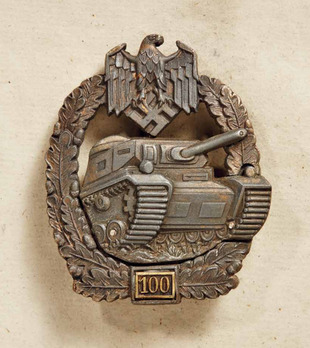
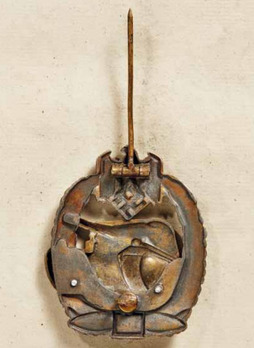
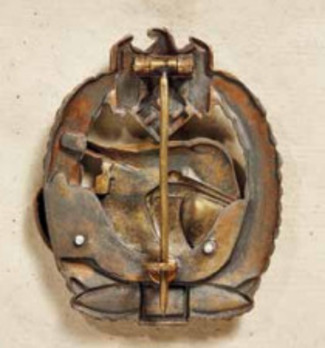
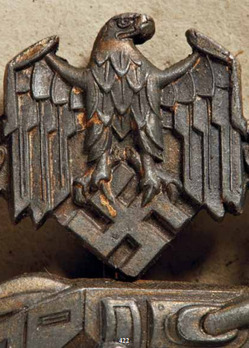
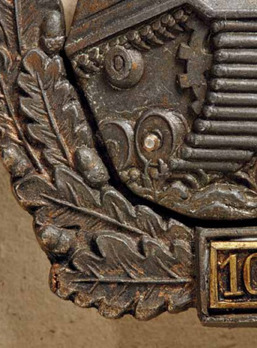
Estimated market value:
Attributes
History
The Panzer Assault Badge in Silver was founded under the order of Colonel General Walther von Brauchitsch on December 20, 1939, and was conferred upon members of the Armoured Panzer Division who participated in three engagements with the enemy on three separate days.
The badge was originally only conferred upon tank crews, and was silver in colour, but on June 1, 1940, the crews of other Armoured Vehicle Divisions and the personnel of the Panzer-Grenadier Divisions became eligible to receive the award in a bronze-coloured version.
On June 22, 1943, the design of the badge was modified, and the numbers 25, 50, 75, or 100 could be added to the base of the award to denote the number of engagements a recipient had participated in. The badges in silver awarded for 25 and 50 tank engagements feature a silvered tank in a silvered wreath; the badges for 75 and 100 tank engagements are larger, and feature a gilt tank in a gilt wreath.
The badges in bronze for 25 and 50 tank engagements are all over bronze, and the badges for 75 and 100 engagements are bronze with gilt wreaths.
The decoration was designed by graphic designer Ernst Peekhaus from Berlin.
The first badges were made from nickel silver. Due to material shortages during the mid and late wartime period, makers eventually changed to zinc. However, other materials like tombac or cupal are also known to have been used. Badges feature either a hollow, a semi-hollow, or even a solid reverse.
Panzer Assault Badges are grouped into several different overall design types. This is due to similarities between some makers creating their dies based on a single shared example.
The “25” badge was designated Grade II, and the “50” badge Grade III. “75” and “100” were both designated as Grade IV. It is unknown why “100” didn’t receive its own Grade V designation. Of the higher grades of the Panzer Assault Badge, “75” and “100” examples are extremely rare. Higher grade badges in bronze are a lot rarer than silver grade ones.
Badges by C. E. Juncker are semi-hollow. Two rivets were used to attach the tank to the wreath. On early badges a third rivet attached the number plate to the wreath. Later examples have the number block soldered to the wreath instead.
Badges by J. Feix are solid. Feix, like other companies from the city of Gablonz, used a crimping technique to hold the reverse hardware in place. This makes their higher grade Panzer Assault Badges easily recognisable. The number plates used by Feix are made of zinc and therefore will often have lost their gold-coloured finish, contrary to Juncker plates that were most often made of steel.
G. Brehmer only produced “25” and “50” Panzer Assault Badges, no “75” or “100” badges. The badges are semi-hollow. The company used low quality zinc combined with a low quality finish, making these badges the least attractive higher grade Panzer Assault Badges today, and difficult to come by in good condition. “50” badges are more common than “25” badges by this maker, and bronze grade badges are very rare.

Versions
$5500 USD
Bronzed Zinc/Zinc gilt
Obv: 100
50x61mm
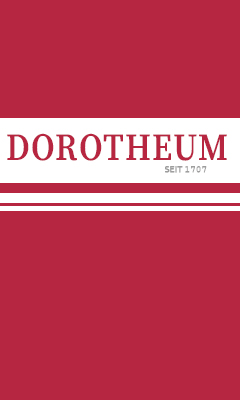

Comments
Sign in to comment and reply.

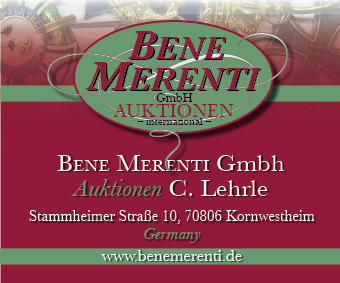
Scroll Top